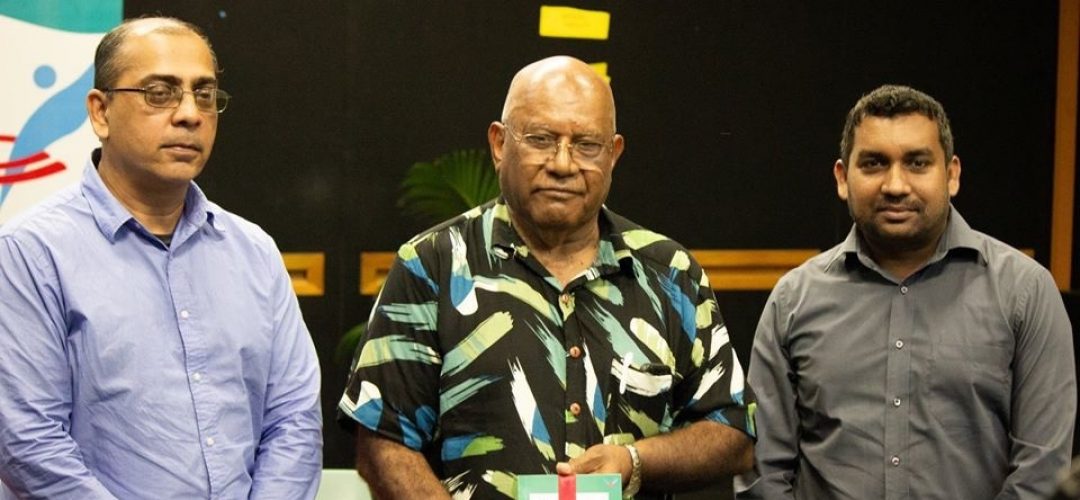Dialogue Fiji launches book on ethnic relations

From left: USP Journalism Coordinator Dr Shailendra Singh, Dialogue Fiji chairman Nemani Buresova and executive director Nilesh Lal at the launch of the Dialogue Fiji publication, Ethnic Relations in Fiji: Threats and Opportunities at USP’s Laucala campus last Friday. Picture: WANSOLWARA
By WANSOLWARA STAFF
Non-state actors have a very important roles to play in bringing about desired social change in order to sustain a multiethnic and multicultural society, says Dialogue Fiji (DF) executive director Nilesh Lal while launching a book on ethnic relations in Fiji.
The Dialogue Fiji publication, titled “Ethnic Relations in Fiji: Threats and Opportunities”, was launched last Friday at The University of the South Pacific in Suva by Dialogue Fiji chairman Nemani Buresova. The book launch was co-organised by Dialogue Fiji and USP’s Journalism Programme, and edited by USP Journalism Coordinator Dr Shailendra Singh and Mr Lal.
According to Mr Lal, the genesis of the publication was the Dialogue on Ethnic Relations organised by DF in consortium with Conciliation Resources and the Citizens Constitutional Forum in November 2017.
“Achieving this social change, especially in a politically charged environment where civil society organisations (CSOs) can very easily be accused of having political proclivities is not an easy task,” Mr Lal said.
“Central to this is having an inclusive approach, and building trust amongst stakeholders, especially those that are on different sides of ethnic, religious, political and ideological divides. Dialogue Fiji has worked tirelessly to create spaces for such engagements, which are devoid of dynamics such as in Westminster parliaments where political point scoring inhibits opportunities for engaging meaningfully and constructively.

“Therefore, it is critical that less adversarial setups are created for deliberation on politically sensitive contentious issues, which polarise societies and constrain the formation of social capital, which is critically needed in developing states.”
“Therefore, it is critical that less adversarial setups are created for deliberation on politically sensitive contentious issues, which polarise societies and constrain the formation of social capital, which is critically needed in developing states.”
The executive director also emphasized the importance of strategic partnerships and how, as a non-state actor, Dialogue Fiji was keen on working with various stakeholders and partners in addressing the deep rooted issues impacting the Fijian society.
Co-editor of the publication and coordinator of USP’s Journalism Programme Dr Shailendra Singh said the publication was a compilation of deliberations from learned individuals with a wide range of experiences.
He also revealed how the presenters shared their experiences not merely from their respective fields but also spoke from their hearts which was indeed very powerful. And, this is what made their stories compelling.
“The lack of social cohesion that is Fiji’s Achilles heel needs to be addressed in a multi-prolonged manner. Multiracialism sounds ideal in theory but it’s incredibly complicated in process, and this is the common thread in the book. Hence, multiracialism needs to be work in progress perpetually and must never be taken for granted,” Dr Singh said.
He said civil society organizations like Dialogue Fiji had a pivotal role to play in fostering social cohesion and organizing important deliberations of these nature.
Dr Singh also highly recommended the publication as a must read for every member of Parliament and the public at large.
Meanwhile, Mr Buresova said the publication was unique in that it was a remarkable product of a CSO.
“It is a product that is genuinely committed to peace building, inclusive and participatory decision-making, democratic transition and good governance. After all, these mechanisms are essential to nation building,” said Mr Buresova.
The book includes contributions from activist Jone Dakuvula, feminist, human rights activist, journalist and writer Seona Smiles, former electoral commissioner Alisi Daurewa and feminist activist Roshika Deo among others.










